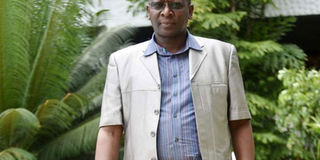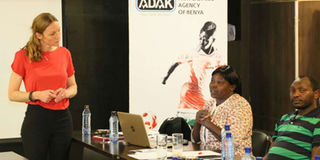From DO to Kenya’s anti-doping chief, Rugut’s walking the talk

Anti-Doping Agency of Kenya chief executive officer Japhter Rugut in Mombasa on the sidelines of an agency workshop on March 2. PHOTO | KEVIN ODIT | NATIONMEDIA GROUP
What you need to know:
- Soon after the agency came into existence as the Anti-Doping Agency of Kenya, mechanisms were put in place to roll out anti-doping programmes with a view to ensuring that Kenyan athletes are sensitised, says Adak chief executive officer.
- Former PC was thrown into the deep end as Kenya battled to put together anti-doping procedures and legislation, but he took it in his stride and has helped the Anti-Doping Agency of Kenya make huge steps forward in the war against use of illegal drugs in sport.
Have you ever come across publicity-shy senior, high profile public servants?
Senior administrators not too eager to take advantage of journalists’ cameras and microphones thrust in their faces?
Get Lost! A round of drinks on me if you can find one.
A battery of journalists at their beck and call would be what most senior officials would gleefully take, so much for the opportunity to display their loyalty to appointing authorities.
And ultimately get the eye of the chief tenant at State House.
Well, Japhter Rugut is from a different breed of public servants.

Japhter Rugut (right), during his days as the Provincial Commissioner (Central Province) in 2009, addresses squatters and journalists. PHOTO | FILE | NATION MEDIA GROUP |
One who would make me a round of drinks poorer. One who doesn’t play to the gallery.
Despite his stellar career in public service, the Anti-Doping Agency of Kenya (Adak) chief executive officer prefers to operate quietly, behind the glare of cameras. Anonymous but quite effective.
You may recall the uproar in Nandi County in 2015 when locals fiercely protested the alleged redeployment, via SMS, of Rugut, then Director General of the National Youth Service.
At the time, Devolution Cabinet Secretary Anne Waiguru was accused of sending home the man from Koitiliol village in Nandi County through a text message.
Screams for Waiguru to resign reached a deafening crescendo.
At the time, Rugut was in mourning, having lost his 22-year-old daughter, Leslie Chepkoech.
Speaker after speaker at the funeral service in Nandi County called for Waiguru to step aside for “sacking” one of their own.
But Rugut took it in his stride, avoiding the topic, and later taking up his redeployment as Sports Secretary in the Ministry of Sports, Culture and the Arts without much ado.
He resisted any temptation to play victim, instead assuming his new role at Kencom House with gusto.
And just as he settled in, Rugut — with over 25 years of experience in public administration tucked under his belt — was appointed Adak CEO in February 2016.
At the time, that was a position few would take up, given the challenges it posed, especially with Kenya under the global anti-doping radar following several cases of positive tests for banned performance enhancing substances by the country’s runners.
But the man — whose meteoric rise from District Officer to District Commissioner and, ultimately, Provincial Commissioner (for eight years) is the envy of many — took everything in his stride, presiding over the greatest push in Kenya’s war against banned drugs in sport.
“I have been an administrator all my life and I must say that public service is one of the most gratifying responsibilities. I have achieved a lot throughout my career but the over arching one is the positive impact I have had in people’s lives in my various capacities in the civil service.”
Such impact is already felt in his current role at anti-drugs chief.
“As a country, and as Adak specifically, we have come from far with respect to the fight against doping,” he says.
“Before the agency was established, anti-doping efforts were majorly conducted by the Africa Zone Five Regional Anti-Doping Organisation (Rado) and specific sports federations,” he added.
“Soon after the agency came into existence as the Anti-Doping Agency of Kenya, mechanisms were put in place to roll out anti-doping programmes with a view to ensuring that Kenyan athletes are sensitized,” he explains.

Anti-Doping Association of Kenya (Adak) Director of Anti-Doping Education and Research Agnes Mangu (centre) makes a contribution during a workshop organised by Anti-Doping Norway in Nairobi on February 5, 2018. On the left is Ann Engelstad, the Advisor, International Relations, at Anti-Doping Norway, while Adak educator Thomas Kemboi is on the right. PHOTO | ADAK |
To Adak’s credit, so far, a total of 38,749 sports persons have been reached through anti-doping information sharing, values-based education and awareness campaigns.
Last Thursday, Adak signed a memorandum of understanding with the Kenya Institute of Curriculum Development (KICD) aimed at the main streaming of values-based anti-doping curriculum in schools.
“This curriculum is aimed at instilling positive values in young learners which is a preventive strategy to deal with doping in sport.”
So far, Adak has tested over 1,200 athletes both in and out of competition. But Rugut concedes that totally eliminating doping isn’t an easy task.
Just as he assumed office at Adak, there was the much-publicised doping case of Kenya’s first Olympic marathon champion, Jemima Sumgong.
The former London, Rotterdam and Las Vegas marathon champion tested positive for blood booster EPO (Erythropoietin) and was handed a four-year ban from athletics.
This case thrust Kenya’s anti-doping mechanism into the limelight.

Japhter Rugut, the Anti-doping Agency of Kenya chief executive officer, during the launch of a memorandum of understanding between the agency and the Kenya Institute of Curriculum Development in Nairobi on March 8, 2018. PHOTO | KANYIRI WAHITO | NATION MEDIA GROUP
Rugut maintains eradicating doping isn’t an Adak-only affair.
“The elimination of doping and subsequent promotion of clean sport is not a one-agency affair. It is a collective effort that requires a multi-faceted approach from varied stakeholders,” he argues.
“For instance in Adak’s case there is a deliberate effort to work closely with the Directorate of Criminal Investigations, the National Registration Bureau, the Department of Immigration, the Pharmacy and Poisons Board and the Kenya Medical Practitioners and Dentists Board.
“All these agencies have respective, specific roles to play in the whole process. In view of this, therefore, it is imperative that for Adak to effectively deliver on its mandate stakeholder support has to be sustained.
So far, Adak has successfully sanctioned eight Kenyan athletes.
They include Florence Jepkosgei Chepsoi, Shieys Chepkosgei and Joseph Kariuki Gitau.
Anti-doping being a new phenomenon in Kenya, Rugut remains confident they will clear the teething obstacles and win the war on drugs.
“When I was given the opportunity to serve our great sports people, and the country, in this capacity, I knew that I had a lot of expectation placed on me from all quarters. “I had to, within a very short time, acquaint myself with this rarity at least in the Kenyan scenario.
“I had to read every available material on anti-doping while also providing leadership to an agency that had no precedence.
“While I am glad that I got the necessary support from my board and team at Adak, I must also add that this was one phase that guaranteed me numerous sleepless nights as we went on to establish the structures of what is now Adak,” he reflects.
His personal high as Adak boss?
“I think the overriding one is the realisation that Kenya now has a vibrant agency that is actively engaged in promotion of clean sport. When I got this appointment, Kenya had just been declared non-compliant to the World Anti-Doping Code and we were just around the Rio Olympics (in 2016).
“There was so much pressure to ensure that Team Kenya was not barred from participating in this global event and so I will say that I dived into the deep end head first.
“I am proud that in record time we were able to fulfil all requirements by Wada and the country eventually took part in the games. The icing on the cake is when I attend the many forums across the globe where we are used as best examples in Africa.”
Rugut singles out the last Wada Foundation Board Meeting in South Korea last November where Adak was applauded for “moving from zero to 100 per cent within a very short time.”
What about the lows?
“I must say that the one singular low for me is to hear that a Kenyan athlete has tested positive for a prohibited substance and especially when they are sanctioned which means that they did not prove beyond doubt how the substance found its way into their body.
“It’s a terrible feeling but I have come to the realisation that life will not always give you what you want. So we have to take the disappointments that come our way as building blocks for the future.”
Very much preferring to stay away from the limelight and prodding media, Rugut observes that his family has played a crucial role in his life as a public servant.
It was during the NYS saga that Rugut and his wife Joyce were also mourning the death of their daughter Leslie, a trying period indeed. “Family is always the bedrock of success especially if you believe in the values of co-operation and commitment to excellence. Public life can take its toll on you just as it is rewarding.
“The beauty of family is that it is the one place where you find solace. It is natural for species in the animal kingdom to cultivate a sense of belonging and togetherness and for us human beings family is the avenue through which we achieve this.
“I owe my success to the support I have received from my family throughout the years.”
What would he like to be remembered as? “That I mentored many and provided them with an avenue to make themselves, those around them, the country and the world better!,” he concludes.





